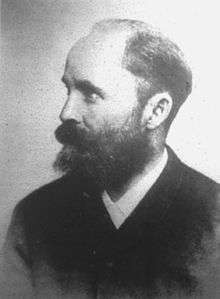Karl, Freiherr von Prel

Karl Ludwig August Friedrich Maximilian Alfred, Freiherr von Prel, or, in French, Carl Ludwig August Friedrich Maximilian Alfred, Baron du Prel (3 April 1839 – 4 August 1899), was a German philosopher and writer on mysticism and the occult. In the literature it has become customary to refer to him under various abbreviated French forms of his name, usually "Carl Du Prel," "Baron Carl Du Prel," or simply "Baron Du Prel."
He was born at Landshut. After studying at the University of Münich he served in the Bavarian army from 1859 to 1872, when he retired with the rank of captain. He then gave himself up to philosophical work, especially in connection with the phenomena of hypnotism and occultism from the modern psychological standpoint. He attempted to deduce the existence of spirit, apart from, and yet entering from time to time into connection with, the phenomena of the senses, by an examination of the relation between the ego of thought and the age of sensible experience as understood by Immanuel Kant.[1] In 1868 he received the degree of doctor from the University of Tübingen in recognition of a treatise on the psychology of dreams (Oneirokritikon. Der Traum vom Standpunkt des transcendentalen Idealismus).
Subsequently, he published numerous works on various psychological and scientific subjects, of which the more important are:
Der gesunde Menschenverstand vor den Problemen der Wissenschaft (1872); Der Kampf ums Dasein am Himmel (1874), republished in 1882 under the title Entwickelungsgeschichte des Weltalls; Die Planetenbewohner and die Nebularhypothese (1880); Die Philosophie der Mystik (1885); Justinus Kerner und die Seherin von Prevorst (1886); Die monistische Seelenlehre (1888); Die Mystik der alten Griechen (1888); Kants mystische Weltanschauung (1889); Studien aus dem Gebiete der Geheimwissenschaften (1890); Der Spiritismus (1893); Die Entdeckung der Seele durch die Geheimwissenschaften (1894–1895).
In Der Kampf ums Dasein am Himmel, von Prel endeavoured to apply the Darwinian doctrine of biological evolution not only to the sphere of consciousness but also even more widely as the philosophical principle of the world. He was one of a large number of German thinkers who during the latter half of the nineteenth century endeavoured to treat the mind as a mechanism.
References
- ↑ "Josephson, Jason Ānanda. "Specters of Reason: Kantian Things and the Fragile Terrors of Philosophy" J19, Volume 3, Number1, Spring 2015, pp. 204-211.". www.academia.edu. Retrieved 2016-03-07.
 This article incorporates text from a publication now in the public domain: Chisholm, Hugh, ed. (1911). "article name needed". Encyclopædia Britannica (11th ed.). Cambridge University Press.
This article incorporates text from a publication now in the public domain: Chisholm, Hugh, ed. (1911). "article name needed". Encyclopædia Britannica (11th ed.). Cambridge University Press.- Josephson, Jason Ānanda. "Specters of Reason: Kantian Things and the Fragile Terrors of Philosophy" J19, Volume 3, Number1, Spring 2015, pp. 204–211.